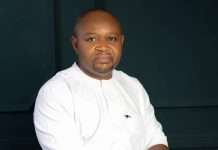Dettol, a global leader in the health and hygiene category, and a power brand from the stables of Reckitt Benckiser, co-sponsored a week-long medical conference, organised by the Nigeria Medical Association (NMA), with participants advocating for improved health care services for Nigerians.
The 53rd NMA Annual Conference, with the theme “e-Health and its Potentials for Improving Healthcare Delivery in Nigeria”, held at the University of Lagos (UNILAG). It pulled a large number of stakeholders, including doctors and other categories of health practitioners, the academia, top government functionaries and key influencers, who expressed a consensus on the need to improve health care delivery in the country.
In a presentation titled, ‘‘The Role of Hygiene in Healthcare Delivery in Nigeria’’, Dettol representative at the Global Hygiene Council, Dr. Nneoma Idika, said in order to achieve a pragmatic e-Health policy for the country, the promotion of hygiene practices, one of which is regular hand wash, could not be over-emphasised.
While noting that the observance of hygiene would go a long way in raising the standards of health among Nigerians, she added that the more government and other stakeholders accorded the concept of hygiene its deserved place, the better for the health of the people. She observed further that hygiene cuts across every sphere of life, ranging from personal to laundry, environmental, food and water, home and hospital, stressing that hygiene was important to keep Nigerians healthy always.
“Infectious diseases kill nearly 10 million people annually, mainly in the developing countries. Fifty per cent mortality in sub-Saharan Africa is due to infectious diseases, while 2 million people die annually due to diarrhoea diseases, especially in children under 5 years, according to the World Health Organization (WHO),’’ she revealed.
Dr. Idika, who doubles as chief research fellow at the Nigerian Institute of Medical Research (NIMR), identified poverty as the reason for poor living conditions in most developing countries, which the government must pay attention to. ‘‘In developed countries, reducing infectious diseases is achieved by programmes that integrate hygiene promotion with improvements in water supply and sanitation,” she said.
She, however, expressed hope that, going by research findings, proper hand washing with soap had been proved to reduce diarrhoea disease by 50 per cent; respiratory infections by 25 per cent; as well as eye and skin infections. In the same vein, she informed the conference that safe disposal of waste, surface hygiene and care of domestic animals have been adjudged potent in breaking the chain of infection transmission.
‘‘Recent studies in the United States reported that disinfectant products stopped the spread of influenza by 31 per cent. In Nigeria, regular hand washing with soap showed 30 per cent reduction in mortality due to diarrhoea infections,’’ Idika said. She advocated for increased synergy between the public and private sectors, policy consistency, capacity building and enlightenment programmes to achieve integrated health care delivery for Nigerians.
On his part, the NMA president, Dr. Osahon Enabulele, said the benefits of e-Health were many, describing it as a safe, secure, ethical and cost effective transmission and exchange of health data and information. While lamenting that Nigeria was yet to explore e-Health, he called for expedited action by the relevant agencies of government, including the Federal Ministry of Health and its Communications and Technology counterpart.
Enabulele enumerated common e-Health applications to include m-Health, Telemedicine and Electronic Health Records (EHR). He noted that, although some medical institutions in Nigeria were currently deploying e-Health, the absence of a national e-Health policy was making it hard to facilitate a systematic, coherent and sustainable implementation of the platform.
“Whereas there is overwhelming evidence that developing countries, such as India, Rwanda, Kenya and Uganda, have explored the potentials of e-Health in transforming their health systems and economies, Nigeria has yet to enthrone a strategic policy for sustained utilisation of e-Health in a way to maximise its alluring and undeniable benefits towards strengthening our health care system,’’ he lamented.
The chairman, Lagos State branch of NMA, Dr. Francis Faduyile, who commended Reckitt Benckiser for its unwavering partnership with the association, said the choice of e-Health as the conference topic was part of efforts by the doctors’ body to make health care more accessible and affordable to the common man.
“With e- Health, we can have a far wide health care accessibility to Nigerians. It is obvious policy makers need to drive it down, but we also need to educate ourselves to let our members know that there is a new thing happening. e-Health is not strange because with electronic medical records, wherever you go, a doctor will be able to see your history and know how to continue treatment,” he submitted.











